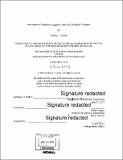Fabrication of reinforced alginate fibers for cell based therapies
Author(s)
Carter, Sydney C. (Sydney Cheyenne)
DownloadFull printable version (1.948Mb)
Other Contributors
Massachusetts Institute of Technology. Department of Mechanical Engineering.
Advisor
Robert Langer.
Terms of use
Metadata
Show full item recordAbstract
Type I Diabetes is a condition in which the pancreas does not produce enough insulin, leading to dysregulation in glucose metabolism. Most Type I diabetics take insulin injections after each meal in order to remain euglycemic. Transplantations of islet cells in immuno-protective alginate capsules has been shown to be promising as a long-term cure for Type I Diabetes. In this study, reinforced alginate fibers were fabricated as an alternative to alginate capsules for islet transplantation. Surgical thread was covered in alginate-cell solution by the microfluidic nozzle system to give a stronger structure to be used for implanting the cells. The thickness of the cell-encapsulated alginate layer produced by microfluidic nozzle processing system was controlled by varying the flow rate of alginate being pumped through the nozzle as well as by varying the speed by which the thread was extracted from the nozzle. The study showed that higher flow rates of alginate and lower thread speeds result in thicker alginate layers for encapsulating more cells within the fiber. The cells remained viable over a month, suggesting plausibility of cell-encapsulated microfibers as a long term solution to diabetes treatment.
Description
Thesis: S.B., Massachusetts Institute of Technology, Department of Mechanical Engineering, June 2016. "February 2016." Cataloged from PDF version of thesis. Includes bibliographical references (page 19).
Date issued
2016Department
Massachusetts Institute of Technology. Department of Mechanical EngineeringPublisher
Massachusetts Institute of Technology
Keywords
Mechanical Engineering.